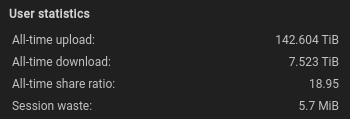
- 0 Posts
- 52 Comments
- Oscar@programming.devtoPiracy: ꜱᴀɪʟ ᴛʜᴇ ʜɪɢʜ ꜱᴇᴀꜱ@lemmy.dbzer0.com•Is this true about Generation gap in Piracy?English13·15 days ago
Duck typing moment
- Oscar@programming.devtoPiracy: ꜱᴀɪʟ ᴛʜᴇ ʜɪɢʜ ꜱᴇᴀꜱ@lemmy.dbzer0.com•Why is seeding a torrent helpful?English12·1 month ago
You’re not wrong, but it bugs me when my ratio drops, so I always seed everything I download. I have a pretty good internet service though.
My stats:

- Oscar@programming.devtoProgramming@programming.dev•Looking for a system/application language that is better than C/C++English1·2 months ago
I think odin could be a good fit. I haven’t used it myself. It seems to focus on 3D and game dev.
Maybe it’s still using the borked config because all sessions were not exited? Try exiting it and then make sure no tmux process is still running, by for example running
ps -aux | grep tmux.Otherwise there must be some tmux config still lying around in your $HOME.
Edit: I don’t know anything about Macs so I’m just assuming it works similar to linux.
Does fzf search hidden folders? You could also try with this, to make extra sure:
find $HOME -name "*tmux*".
I used vscode for a few years, but I eventually went back to neovim/tmux. It’s a lot less resource heavy, and it’s easy to just ssh and jump in from home. I also much prefer a modal editor and I don’t want to have to touch a mouse.
- Oscar@programming.devtoProgramming@programming.dev•"Ladybird announcement" by Andreas Kling (from SerenityOS)English1·4 months ago
What makes Servo a better bet than Ladybird? Who backs it?
- Oscar@programming.devtoProgramming@programming.dev•Is this the electron-alternative we've been waiting for?English13·4 months ago
Since people keep bringing up tauri, here’s the comparison made in the README:
Dioxus vs Tauri
Tauri is a framework for building desktop (and soon, mobile) apps where your frontend is written in a web-based framework like React, Vue, Svelte, etc. Whenever you need to do native work, you can write Rust functions and call them from your frontend.
-
Natively Rust: Tauri’s architecture limits your UI to either JavaScript or WebAssembly. With Dioxus, your Rust code is running natively on the user’s machine, letting you do things like spawning threads, accessing the filesystem, without any IPC bridge. This drastically simplifies your app’s architecture and makes it easier to build. You can build a Tauri app with Dioxus-Web as a frontend if you’d like.
-
Different scopes: Tauri needs to support JavaScript and its complex build tooling, limiting the scope of what you can do with it. Since Dioxus is exclusively focused on Rust, we’re able to provide extra utilities like Server Functions, advanced bundling, and a native renderer.
-
Shared DNA: While Tauri and Dioxus are separate projects, they do share libraries like Tao and Wry: windowing and webview libraries maintained by the Tauri team.
-
- Oscar@programming.devtoLinux@programming.dev•[Weekly thread] GNU+Linux help thread: ask anything!English2·4 months ago
That’s OK, we all got our own preferences 😉 But I think you will be pretty good to go on t495. It has apparently been linux certified on older Ubuntu, which Mint is based on.
https://ubuntu.com/certified/201905-27049
Also linux certified by Lenovo:
https://support.lenovo.com/us/en/solutions/pd500343-linux-certification-thinkpad-t495-20njz4krus
- Oscar@programming.devtoLinux@programming.dev•[Weekly thread] GNU+Linux help thread: ask anything!English3·4 months ago
For arch you can look here:
- Oscar@programming.devtoProgramming@programming.dev•POSIX.1-2024 has been publishedEnglish1·5 months ago
deleted by creator
deleted by creator
- Oscar@programming.devtoLinux@programming.dev•Viable Alternative for ZSH as the interactive shell?English1·5 months ago
Drop oh-my-zsh and look for something else to customize your prompt. I like Powerlevel10k but Starship is good too.
- Oscar@programming.devtoProgramming@programming.dev•It's so obvious when someone has a JavaScript backgroundEnglish2·5 months ago
C is a pretty simple language and relatively easy to learn. But it’s a lot harder to be proficient with.
- Oscar@programming.devtoProgramming@programming.dev•Is TypeScript a fad or is my manager delusional?English1·7 months ago
Can’t they just use JSDoc?
By the same argument, wouldn’t GPL and other copyleft licenses be considered non-free as well since you are not free to do whatever you want with the source? For example, incorporating it into a proprietary project, refusing to provide the source to users upon request, or not disclosing attribution, etc. The latter would even go against the terms of permissive licenses.
Clearly defining what free, and by extension FOSS, means is very relevant.
- Oscar@programming.devtoProgramming@programming.dev•How can I setup pandoc to work with lua language server?English1·8 months ago
It seems that no lua is packaged with pandoc-cli (By looking at the package contents of https://archlinux.org/packages/extra/x86_64/pandoc-cli/)
So if I were you I would first try the AUR and see if there’s any package there that does.
- Oscar@programming.devtoPiracy: ꜱᴀɪʟ ᴛʜᴇ ʜɪɢʜ ꜱᴇᴀꜱ@lemmy.dbzer0.com•What VPN would you recommend for torrenting?English12·8 months ago
It’s when you open a publicly facing port and map (forward) it to a local port your machine. In this case, it’s opened at the vpn provider’s public gateway. Otherwise, it would typically be opened in your router instead.
You can then configure your torrent client to listen on that local port that the public port is forwarded to. I think generally the public and the local port are the same number when using VPN.
If you do that, then others have the ability to initiate a connection to you instead of only you being able to initiate the connection to somebody else.
When seeding/leeching to/from someone else, at least one of you needs a port open. So, if you always have one open, you allow yourself to connect to anyone on the network regardless if they have one open or not.
Sorry if I confused you more, I’m not that great at explaining.
- Oscar@programming.devtoPiracy: ꜱᴀɪʟ ᴛʜᴇ ʜɪɢʜ ꜱᴇᴀꜱ@lemmy.dbzer0.com•*Permanently Deleted*English9·8 months ago
I seed without cap, don’t really need my upload for anything else. (500 Mbps)
What’s the distro? I can help seed it indefinitely with open ports.